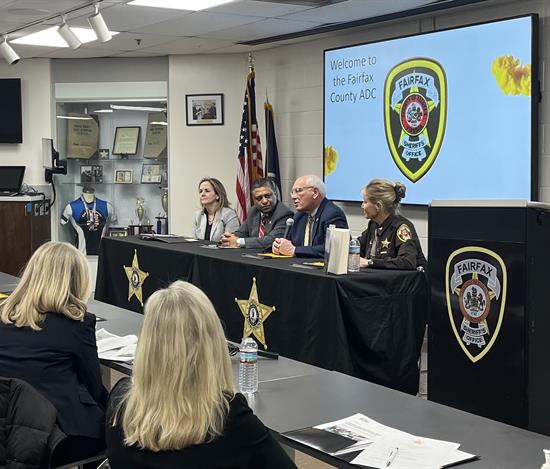- Home
- About
-
Constituent Services
- Academy Nominations
- Community Project Funding
- Congressional Art Competition
- Congressional App Challenge
- Congressional Commendation
- Event Invitation
- Grants
- Help with a Federal Agency
- Internships
- IRA Clean Energy Consumer Benefits
- Know Your Rights: Immigration
- Request a Meeting
- Request Surplus Books
- Presidential Greeting
- Visit Washington D.C.
- Issues & Legislation
- News
- 20th District
- Contact

Press Releases
Tonko, ATR Caucus Visit Fairfax Jail to Learn More About Addiction Treatment & Recovery ServicesMembers heard from correctional staff, experts & incarcerated individuals about the success Fairfax County Jail has had in reducing overdoses
FAIRFAX, VA,
January 31, 2024
Tags:
Addiction & Recovery
FAIRFAX, VA — Addiction, Treatment, and Recovery (ATR) Caucus Co-Chair Congressman Paul D. Tonko (NY-20) and other caucus members on Monday, January 29th visited Fairfax County Sheriff’s Office-Adult Detention Center to learn more about treatment and recovery resources and challenges for incarcerated individuals. The members toured the detention center’s Striving to Achieve Recovery (STAR) Program and spoke directly with law enforcement, experts, and incarcerated individuals about the ways in which Fairfax County Jail has worked to reduce overdose deaths. Office of National Drug Control Policy (ONDCP) Director Dr. Rahul Gupta attended the visit as well and spoke to the work of ONDCP to ensure jails and prisons across the nation have access to treatment for substance use disorder. In addition to Tonko, the members in attendance included ATR caucus Vice Co-Chair Madeleine Dean (PA-4), Abigail Spanberger (VA-7), Becca Balint (VT), and Tony Cardenas (CA-29). The visit was planned in collaboration with the Overdose Prevention Initiative (OPI) at the Global Health Advocacy Incubator (GHAI), which advances policy solutions that save lives and end the U.S. overdose crisis. “Too often, our justice system is a revolving door for those struggling with addiction and mental health issues,” Congressman Tonko said. “Lack of effective treatment upon release compounds that problem, leading to the horrifying statistic that individuals leaving jails and prisons are roughly 129 times more likely to die of an overdose in the first two weeks after release. But there is hope; smart policies that increase access to treatment for incarcerated individuals have huge benefits, not just for those individuals but for their families, correctional staff and law enforcement, and all of our communities. The STAR Program at Fairfax County Jail is proof of the lifesaving benefits of these policies. It is my hope that this program can serve as a model across the nation, and that we as members of Congress can come together to pass comprehensive, compassionate legislation, such as my Reentry Act and the Due Process Continuity of Care Act to bring that vital treatment to those who need it most.” Fairfax County Sheriff Stacey Kincaid said “Addiction is a chronic disease and should be treated as such. We have invested resources in strong, evidence-based addiction recovery programs because we care, and it’s the right thing to do. We are an extension of the public health care system, and we pride ourselves in going above and beyond what is expected. Between our STAR and Medication for Addiction Treatment programs, and our vast reentry supports, we are returning justice-involved individuals to the community in much better health than when they came in. We screen for substance use disorders and co-occurring mental health issues at booking, and our medical team and behavioral health clinicians offer health care, medication and peer support, as needed, throughout a person’s incarceration. With support from our partners at the time of release, we can provide cell phones with pre-paid minutes, recovery housing scholarships, backpacks with basic necessities, clothing, a two-week supply of medication, and transportation to an addiction medication clinic. I sincerely hope these programs can be replicated across the country. Our programs reduce stigma, provide hope and save lives!” “In his Unity Agenda for the nation, President Biden made clear that addressing the overdose epidemic will require a whole-of-society effort,” said White House Office of National Drug Control Policy (ONDCP) Director Dr. Rahul Gupta. “There are nearly 2 million Americans with substance use disorder in our jail and prison systems, and when released, they are more than 120 times more likely to overdose. Ensuring people who are incarcerated can access treatment in jails and prisons is critical to beating the opioid crisis. It was an honor to join Members of the House Addiction, Treatment, and Recovery Caucus to see firsthand the great work that Sheriff Kincaid and the Fairfax County Jail are doing to support incarcerated individuals with substance use disorder through their STAR Program. The Biden-Harris Administration is committed to lowering barriers to treatment and expanding access to medications for opioid use disorder in jails and prisons across the country so that people who are incarcerated can receive the services they need to get back on their feet.” Just last week, Dr. Gupta published an op-ed in The Hill highlighting the critical importance of expanding access to treatment for substance use disorder in jails and prisons to help address the nation’s overdose epidemic and save lives. The Addiction, Treatment, and Recovery Caucus is made up of more than 75 Members of Congress from both sides of the aisle and is the first and longest running Congressional caucus that recognizes addiction as a disease. The Caucus has long been dedicated to education and to raising awareness among lawmakers about addiction with a strong focus on increasing legislative support for expanding access to prevention, treatment, and recovery services. This year marks the ATR Caucus’ 20th anniversary. |
